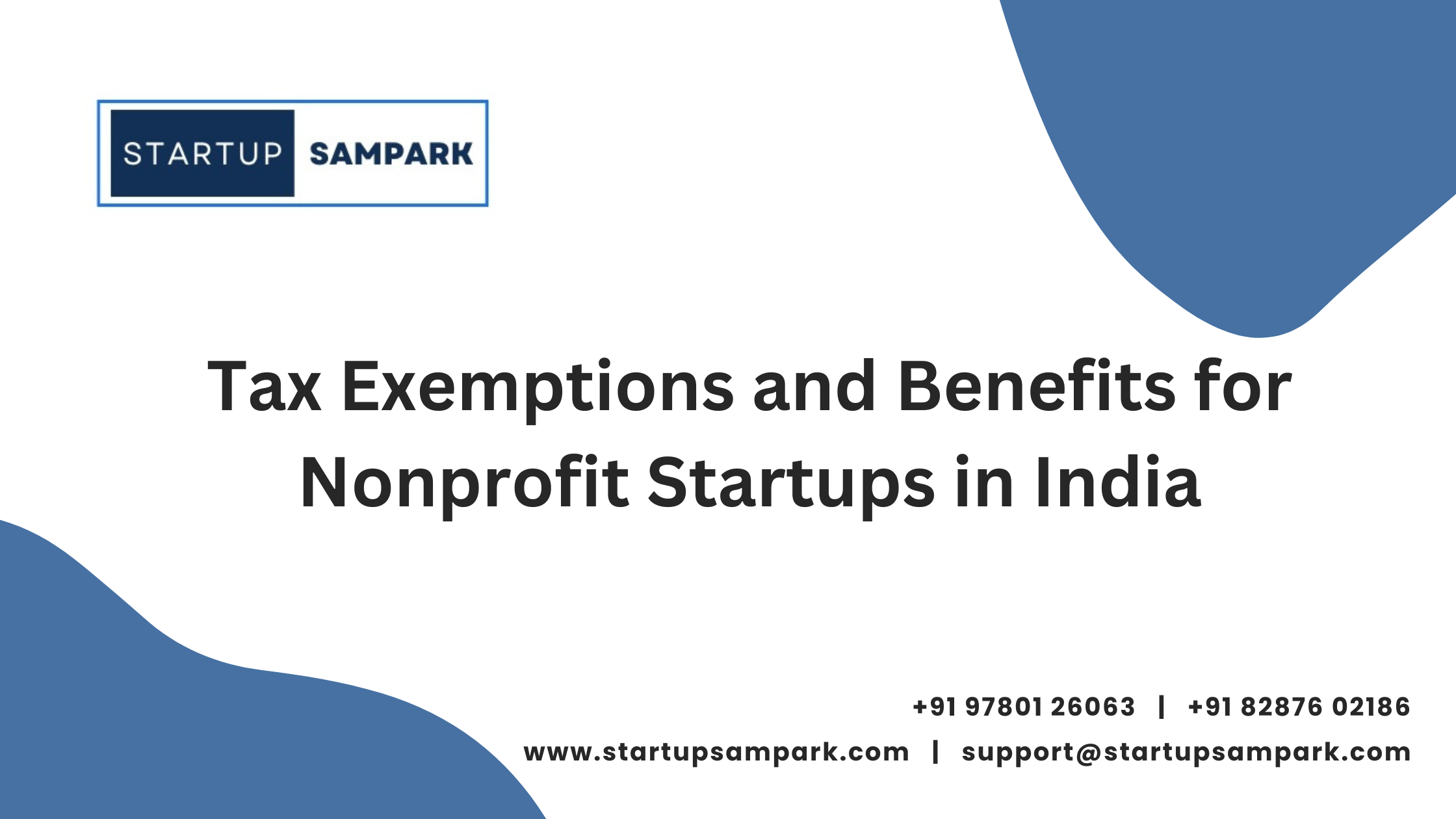Tax Exemptions and Benefits for Nonprofit Startups in India
Tax Exemptions for Nonprofits in India
Nonprofit startups in India, particularly those that are registered under the Companies Act, 2013 (like Section 8 companies), Trusts, or Societies, can avail various tax exemptions and benefits to support their mission and activities. These exemptions are granted with the intent of encouraging social, charitable, educational, and environmental initiatives that benefit the public. Nonprofit organizations are not intended to generate profits for private benefit, so they are afforded tax relief, ensuring that their resources are maximally directed toward their social goals. However, to enjoy these benefits, nonprofits must fulfill specific eligibility criteria and comply with regulatory requirements.
Section 12A and 80G Tax Exemptions
One of the most significant tax exemptions for nonprofit startups is the Section 12A and Section 80G of the Income Tax Act, 1961. Section 12A allows nonprofit organizations to be exempted from paying income tax on their earnings, provided that the organization applies its income to charitable purposes and meets the necessary criteria. To obtain this exemption, nonprofits must apply for registration under Section 12A with the Income Tax Department.
-
 Startup Registration (DPIIT Recognition)₹8,850.00
Startup Registration (DPIIT Recognition)₹8,850.00
In addition, Section 80G offers tax benefits to donors who contribute to eligible charitable organizations. Under this section, donors can claim tax deductions for their contributions, encouraging individuals and corporations to donate more generously to nonprofit causes. The nonprofit organization must be registered under Section 80G to provide this benefit to its donors. These registrations enable nonprofits to enhance their fundraising efforts while also benefiting from significant tax savings.
GST Exemption for Nonprofit Organizations
Another key benefit for nonprofit startups is exemption from Goods and Services Tax (GST). Nonprofit organizations are generally exempted from GST for the supply of goods and services when they are involved in charitable or religious activities. However, if a nonprofit engages in commercial activities (such as selling products or providing services that generate revenue), it may be required to pay GST depending on the nature of the activity. Nonprofits need to ensure that their activities fall under the exempt categories to maintain their GST-exempt status.
Additionally, nonprofit organizations involved in education, healthcare, religious, and charitable activities are often allowed to claim refunds on GST paid on purchases related to their exempt services. Therefore, nonprofits must carefully document their activities to ensure compliance and to leverage these benefits. This exemption allows nonprofits to reduce operational costs, enhancing their financial sustainability.
Tax Deductible Donations and Fundraising Opportunities
Nonprofits in India can also benefit from tax-deductible donations, which allow them to raise funds more effectively. Section 80G registration for the nonprofit allows donors to claim deductions for their contributions to the organization. Depending on the status of the nonprofit, donors can receive deductions of up to 100% of the donated amount, or 50%, with or without restrictions. This incentivizes donations by offering a direct tax benefit to the donors, thereby making it easier for nonprofit startups to garner support.
Furthermore, Section 35AC (for certain types of public charitable activities) and Section 35(1)(ii) and (iii) (for research institutions and approved educational trusts) offer additional tax deductions for specific donations made towards targeted nonprofit initiatives. These exemptions help attract funding from philanthropic individuals, corporations, and even foreign donors, all of whom are incentivized by the opportunity to reduce their taxable income.
Exemption from Property Taxes for Charitable Trusts and Societies
Nonprofit organizations, especially charitable trusts and societies, can also benefit from exemptions from property taxes for properties used exclusively for their nonprofit activities. These include properties used for educational purposes, religious purposes, and other charitable activities. The exemption is usually granted based on the nature of the organization’s use of the property, provided that the property is not being used for commercial purposes.
The eligibility for property tax exemption depends on specific state laws and requires that the property is not used for personal or commercial gain. Nonprofits can apply to the local municipality or state government for tax relief. This exemption is particularly beneficial for nonprofit organizations with large-scale operations and real estate assets, as it can significantly reduce their operational costs.
Access to Grants, Subsidies, and Government Schemes
In addition to tax exemptions, nonprofit startups in India can benefit from various government grants, subsidies, and schemes designed to support social, educational, and environmental causes. The Indian government, through various ministries, offers funding and support to eligible nonprofits involved in activities such as poverty alleviation, healthcare, education, environmental conservation, and women’s empowerment.
By being registered with the appropriate authorities and maintaining their nonprofit status, organizations can apply for these grants and subsidies, which can be pivotal in scaling their impact. Examples of such government schemes include the Swachh Bharat Mission, National Social Assistance Programme, and Start-up India schemes. These grants often come with specific compliance requirements, so nonprofits must ensure they meet all conditions to qualify for and retain access to these funding opportunities.
Startup, India
-
 Startup Registration (DPIIT Recognition)₹8,850.00
Startup Registration (DPIIT Recognition)₹8,850.00















Post Comment